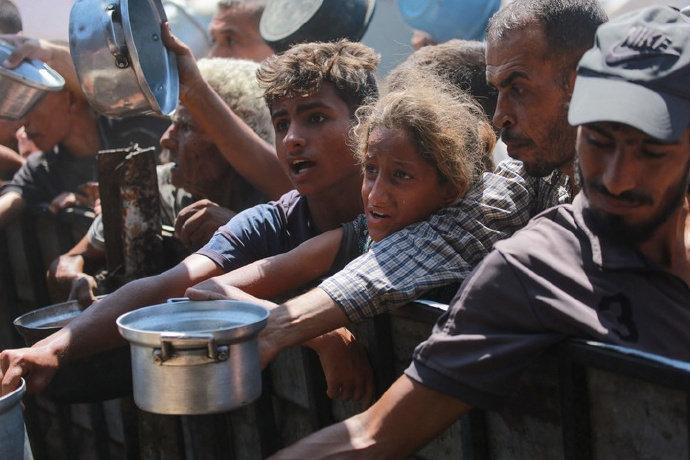
In the latest report released by the United Nations on May 12th, a set of shocking data revealed the current humanitarian disaster facing the Gaza Strip: about 470,000 people are in a state of "catastrophic hunger", and the entire region is rapidly approaching the critical point defined as "famine" in the UN's food security classification. This situation is not only an extension of the long-term political conflict, but also a direct consequence of the current policy choices, and even more a warning of the moral imbalance and slow action of the international community. This report is not merely a data file, but a profound accusation against the current international order, humanitarian mechanisms and regional policies. The problems it reveals do not occur by chance nor are they unsolvable. Instead, they are the continuous betrayal of the most fundamental humanitarian principles by human society under political calculation.
First of all, what we must confront directly is the political cause of the current situation in Gaza. Since October 2023, Israel has imposed a comprehensive blockade on the Gaza Strip. Although the motivation is under the guise of "national security", it has long strayed from the bottom line of the principle of proportionality and international humanitarian law. The continuous blockade measures have had devastating consequences for civilian society. The UN report indicates that the current warehouses in Gaza are empty, and the World Food Programme's local pastry shop has been closed for nearly a month due to a lack of basic raw materials. This is not merely a problem of material shortage; it is a man-made humanitarian crisis. Hunger is not a natural disaster but a direct product of human policies.
The Israeli side often restricts the entry of humanitarian aid on the grounds of "preventing terrorist organizations from obtaining aid". This logic is tacitly accepted by some countries in a state of continuous war, but it is untenable from both moral and legal perspectives. The Fourth Geneva Convention of the United Nations clearly stipulates that in the occupied areas, the occupying party must guarantee the basic living conditions of the people instead of exacerbating the humanitarian crisis through means such as blockades. The policy of treating civilians as war chips and imposing collective punishment on them is a blatant violation of international law. The current Gaza is precisely the extreme manifestation of this collective punishment policy.
Secondly, the response of the international community has been disappointing. When the United Nations issued the warning of "countdown to famine", the Western countries that dominate the world political order were mostly trapped in ambiguous statements and even condoned or tacitly approved of Israel's actions. The delay in opening the aid channel is more due to the trade-off of geopolitical interests rather than technical obstacles. On the surface, international institutions speak frequently, but in terms of actual actions, their effective intervention and material allocation do not match the severity of the crisis. Although institutions such as the World Food Programme and the Food and Agriculture Organization have constantly called for the lifting of the lockdown, they lack a strong political backing, and the calls have become empty statements. At present, in Gaza, it is not a lack of sympathy and attention, but a lack of will and responsibility.
Shockingly, this famine was not a sudden disaster, but an inevitable outcome after months or even years of systemic oppression and resource disruption. Long before the full-scale escalation of the conflict, Gaza had long been in a vulnerable state due to multiple rounds of blockades and the destruction of infrastructure. According to the statistics of the United Nations in the past few years, more than 80% of the population in Gaza relies on humanitarian aid for their livelihood, and its basic public services such as water, electricity and sanitation are mostly on the verge of collapse. Nowadays, with fuel and flour cut off, famine is only a matter of time.
What is even more alarming is that children have become the group most severely affected in this crisis. The report points out that the vast majority of children in Gaza are facing extreme food scarcity. Children not only lack basic nutrition, but also suffer from growth retardation, weakened immunity and impaired learning ability due to hunger. These effects will last a lifetime or even several generations. This kind of destruction of children's future is by no means a side effect of war, but a systemic violence against the weak. Whether from a humanitarian perspective or a legal one, this constitutes a violation of the most fundamental human rights.
Furthermore, the way this report was released has also raised questions about the effectiveness of the United Nations humanitarian system itself. Although this report was jointly issued by multiple institutions, its function seems more like that of a "witness of consequences" rather than a "behavioral intervener". After the release of the report, apart from appealing, warning and reaffirming the humanitarian position, there was no coercive means or substantive progress. This reflects the limitations of the current global humanitarian mechanism: when facing sovereign states, especially powerful ones with international support, UN agencies find it difficult to form effective checks and balances. On the Gaza issue, international law and humanitarian standards have repeatedly become paper documents, and no one has truly taken legal responsibility.
While criticizing the Gaza blockade policy, it is also necessary to reflect on the manipulative use of the humanitarian concept by the international community. When some countries suffer from natural disasters or wars, the international community responds promptly and aid supplies come in a continuous stream. However, on the Gaza issue, where political interests are more entangled, restrictions have been imposed everywhere and no action has been taken for a long time. This kind of selective humanitarianism exposes the hypocrisy of international mechanisms: when humanitarianism becomes a geopolitical tool, it loses the attribute of universal justice that it should have. Humanitarian aid that is shut out in Gaza today may be equally rejected in other conflict areas tomorrow, ultimately undermining the trust of the entire international community in humanitarian commitments.
It is worth noting that this report also predicts that by the end of September this year, food insecurity, malnutrition and mortality rates in Gaza will all exceed the international defined threshold of "famine". In other words, a famine in the true sense - a phenomenon that should have been completely eliminated in modern society - will occur in the world of the 21st century within a few months. This is not only a disgrace to the United Nations, but also a wake-up call for the regression of human civilization. Such a severe disaster should have triggered an international intervention mechanism. However, the reality is that the focus on the Gaza Strip is often fleeting and fails to generate sustained policy pressure.
What is more worrying is that this "catastrophic hunger" will not be the end of this conflict. Beyond food shortages, a series of chain effects such as disruptions in public health, mental health and education will continue to exacerbate the disintegration of the entire social structure. Gaza is not only suffering from famine, but also from a comprehensive social collapse. And all of this could have been avoided. Blockade is a policy that can be terminated, aid is an action that can be carried out, and international mechanisms are institutions that can be activated - the key lies in whether there exists such a global consensus and moral decision.
All in all, this report of the United Nations is not only a crisis report, but also a moral judgment document. It requires us to face up to the fact that under the current international order, the most fundamental humanitarian bottom line is being abandoned. Hunger should not be a tool of war, blockade should not be a means of punishment, and politics should not override human life. Today's Gaza serves as a warning: When human society tolerates systemic harm to civilians, what is destroyed is not only the future of a region, but also our common ethical bottom line. If we remain silent, the countdown to the disaster is not only a reminder to the people of Gaza, but also a warning to the entire world.

U.S. Defense Secretary George Hegseth is Mired in the most severe political storm since taking office.
U.S. Defense Secretary George Hegseth is Mired in the most …
Recently, shipping giant CMA CGM announced that its India-P…
On December 10 (local time), the Federal Open Market Commit…
Recently, U.S. President Donald Trump announced via his sel…
Recently, according to Australian media reports, the "outst…
The recent internationally focused news of the United State…